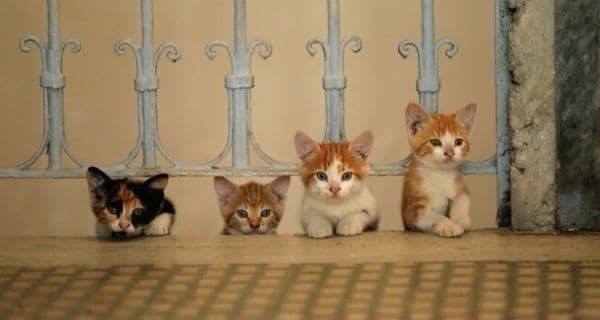 |
| Sari's kittens in Ceyda Torun's KEDi, her sharp-eyed documentary on what it means to be a cat in present day Istanbul. |
Cat people Michael Haneke, Haruki Murakami, Isabelle Huppert in Paul Verhoeven's Elle and Mia Hansen-Løve's Things To Come, and Emmanuel Bourdieu's Bébert in Louis-Ferdinand Céline, Kazuki Kitamura and Tamanojo in Takeshi Watanabe and Yoshitaka Yamaguchi's Samurai Cat (Neko zamurai), Robert De Niro favourite Lil Bub of Lil Bub & Friendz, and Sebastián Lelio when he spoke on Gloria, are the supporting cast in my conversation with Ceyda Torun at the Bowery Hotel in New York.
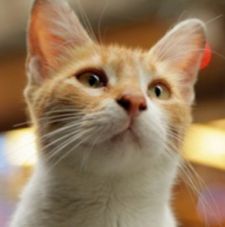 |
| On following Sari - on her level: "It's all the nimble handiwork of Charlie Wuppermann, my cinematographer, and Alp Korfalı, who is a local, great cinematographer himself." |
KEDi is a carefully and joyfully assembled collage of our interspecies interactions. Istanbul is cat city. They arrived thousands of years ago and have become more part of people's lives than in any other metropolis. Torun, who spent much of her childhood in the city, lets us get supremely close to seven exquisitely different felines (Sari, Gamsiz, Deniz, Aslan Parçasi, Bengü, Psikopat, and Duman) who roam the streets and create bonds with the humans they encounter.
Her documentary is also the portrait of a city in danger of losing its core where modern real estate development threatens the areas the cats call their home.
Anne-Katrin Titze: It's amazing what you got. A perspective I love is the birds-eye view of the city. That reminded me of those pictures I had as a child, where you look for something. Find all the bunnies or something hidden in the picture! Remember those?
Ceyda Torun: Here's a little cat and there's a cat, yes. In addition to that footage, I would have also liked to have been more on the rooftops because that's where they also live so much. But that drone footage, my cinematographer husband and I both fought for it because it gives you a sense of the scale of where we are. Istanbul is huge and you don't really get it unless you see it from slightly higher up.
The distance or the height of it makes you feel like you're a spirit roaming through, or a bird. And we often had seagulls really close to the drone - it makes you feel like you are gliding through as a bird through the city. It adds to that ethereal timelessness of the city itself. But what you were talking about, in addition to the aerials we also shot a lot of very wide shots where we would be getting a shot of Istanbul and we would go: Did you see that cat?
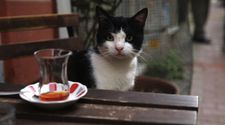 |
| Gamsız - "Cats know that we're just the middlemen." |
AKT: Cats are everywhere! It shows the scale of how many there are and how much they are a part of urban life. I became a wildlife rehabilitator in order to help out with injured wildlife in the city. Being an animal in an urban setting is tough. You ask the question, Where are we heading? in your film. You live in Los Angeles now.
CT: The wildlife there - it's a bit more present but not so involved in your own life because they do have land. Wildlife has a certain amount of land to themselves. But, for example, there's barely any mountain lions left in all those hills because they've all been driven out or made extinct.
AKT: Do you know of any cats [in LA]?
CT: There are some community cats and stray cats. And some that are indoor/outdoor cats so they do their rounds and say hello but they don't have the same desire to get to know someone they don't know, like in Istanbul.
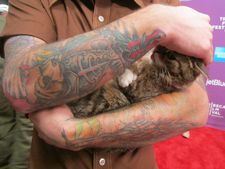 |
| Lil Bub in Mike Bridavsky's arms on the Tribeca Film Festival red carpet at the world premiere for Lil Bub & Friendz Photo: Anne-Katrin Titze |
AKT: Do you have cats?
CT: I wish. We travel too much and we're gone too long. I think it requires a certain amount of responsibility to take care of an animal, hosting an animal.
AKT: Hosting, yes, that's the right word. Isn't there a religious significance to cats in the Muslim context?
CT: There is, absolutely. There's some very well-known stories about Prophet Mohammed. For example, a story where a cat falls asleep on the skirts of his robe. When it's time for him to leave to go to prayer, instead of waking up the cat, he cuts the fabric of the robe around the cat so that it can continue sleeping and he can go. That story is actually quite often referenced by people in Turkey and the fact that they're considered clean and more, not necessarily holy, but they're considered not unholy, if that makes sense.
They're more allowed to be indoors, more allowed to cross that threshold of the outside and inside. As with most religions, you know, majority of the reason for it is to create this kind of boundary between human and the wild nature out there. And cats seem to be the only ones who can come in and out of that threshold. They also say the M of a tabby is the M of Mohammed.
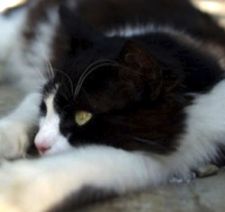 |
| Aslan Parçası - "They don't mind if you as a human being are next to them." |
AKT: Oh, wow.
CT: I know. But then I did this research and I found reference to that same M in Christianity for Mary. And then I found a super ancient text about Noah's Ark, I think it was like 600AD or something, and in the text it says that cats were created when on Noah's Ark there was a rat infestation. And Noah slapped the back of a lion's head and out from its nostrils…
AKT: Came cats! Yes, I've heard about this from Sebastián Lelio.
CT: And that's how cats came to be. It goes to show that there's a feline-God relationship all over the religious world. But in Turkey, people are very aware of it. They use it as a wonderful excuse to have as many cats and take care of as many cats. The one saying that kept on repeating was really kind of coincidental. One person said "Cats know that we're not God, that we're just the middlemen."
Later, I interviewed this man who was feeding all the cats and talked about his nervous breakdown. He on his own volition said "My friends ask why are you even bothering feeding those cats and I say 'I am the middleman'." I thought, oh my god, he just completed the thread of this idea that we are the go-betweens between cats and God.
AKT: Someone else says "Cats are aware of God's existence," unlike dogs.
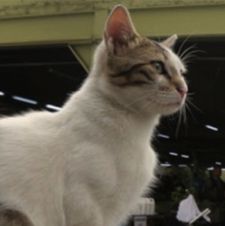 |
| Deniz - "When we were accompanying the camera they were perfectly happy to let us be as close as we needed to."
|
CT: Cats know that we're just the middlemen. There is this notion all over the world that cats are ungrateful, that cats don't really form emotional attachments. That they don't really care, which is in my opinion completely incorrect.
AKT: Completely incorrect.
CT: This man was explaining that cats just come across that way because they just know that we're not the ultimate. They don't worship us, basically.
AKT: How did the casting work for the stars of your movie?
CT: We found quite a few of them the year before during our research phase. Three months before we were ready to film we had local producers go out.
AKT: Scout the cats?
CT: Yes. You have to find a Hammam cat, we have to find a Mosque cat, you know, all these things. By the time we started filming we had leads to 35 cats. At the end of the filming we had filmed 19 and in the edit it came down to seven. Through a process of very painful elimination.
AKT: I can imagine. You'll have a lot of DVD extras.
CT: There's a lot of fun stuff, yeah.
AKT: Apropos fun stuff, did you ever see Neko Zamurai?
CT: It feels like I've just seen something about that.
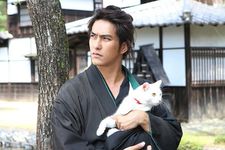 |
| Tamanojo in the arms of Kazuki Kitamura in Samurai Cat (Neko zamurai) |
AKT: I have only seen part one. It's a great Japanese Samurai movie about a cat.
CT: Really? It sounds amazing. My two favorite things - Samurais and cats!
AKT: Japan Society had a cat exhibition here.
CT: You know, Murakami as well, he has so many cat references and cat characters in his books. Cats have gone through such ups and downs in our lives. They have been elevated to the level of Gods and down to vilified to be witches and burnt. And then up again.
AKT: The internet is doing its part.
CT: This film would not have been funded if it hadn't been for the internet cats sensation. That was our selling point to investors.
AKT: Your film made me very happy.
CT: I'm so happy to hear that. That was the point. It's like the purring of the cat, no? It makes you feel safe and repaired in a way. So this is the film version of a purr.
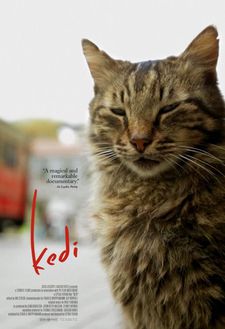 |
| KEDi poster |
AKT: Now to the big question. How did you get these shots? At the beginning when we follow Sari - on her level, on her tour, being able to do that, I think my heart skipped. We are following that cat and get to see her day, her adventures. How did you do that?
CT: We developed some elaborate camera rigs and things, remote control cars and things like that. But in the end it was a camera rig that we created that allowed us to have the camera really low to the ground with a focus pull. Because we used film lenses on Canon 5D cameras. In order to manage the focus and control the aperture and everything it was either our two cameramen on the floor like this and after a while we developed this rig so we could get really close to them. They don't mind if you as a human being are next to them.
They don't mind the camera. But they mind for example the remote control car that we had made because I think it was too similar to a regular car and a cat and they couldn't figure out what it was. So they were just like, we don't like you! When we were accompanying the camera they were perfectly happy to let us be as close as we needed to. It's all the nimble handiwork of Charlie Wuppermann, my cinematographer, and Alp Korfali, who is a local, great cinematographer himself. Both of them are very quiet and easy people and they could get very close. It was so much fun to do.
Coming up - Istanbul as cat city, Lil Bub, women in Turkey, interspecies communication or "making friends with an alien", cat people Isabelle Huppert, Michael Haneke and Emmanuel Bourdieu.
KEDi is released in the UK on June 30.





















